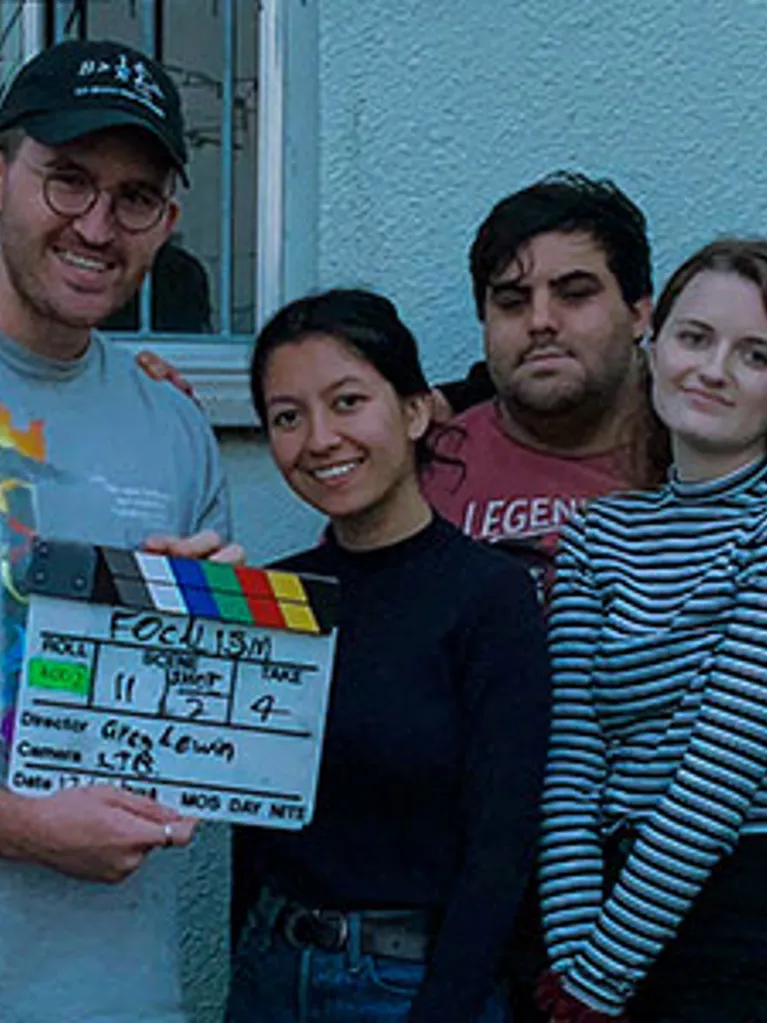You never know what kinds of courses can complement each other in such an amazing way...
After completing an honours degree in psychology and getting a job at a corporate firm, Greg found out he wasn't receiving the creative outlet he needed, so he decided to study film at JMC and combine his passions...
Now, after finishing with flying colours, and being inspired by some research, Greg has decided to use his two degrees to implement widespread behavioural change programs that utilise film and media for the benefit of the greater good.
It's definitely a mouthful, so we caught up with Greg to chat more about this amazing project.
What made you want to take on a project like this?
Prior to attending JMC, I had finished my honours degree in psychology and was working at a large corporate firm. I'd realised that the firm wasn't a good fit for me and likely wouldn't ever be - I had a bit of a moral dilemma, and the lack of creativity also contributed to my need to recalibrate my trajectory. I needed to create a plan that coupled creativity and psychology for a larger long-term plan that I could work towards. After a fairly extensive period of researching possible courses of action, I was fairly enlightened by research by a woman named Professor Paluck from Princeton University. Alongside researchers from MIT, they were able to couple widespread behavioural change theories and the creation of films - created by working alongside local 'Nollywood' producers - to increase positive community-minded behaviours on a massive scale. My thinking was that it was essential, then, for me to attend a film school in order to learn everything there was to know about filmmaking - at least all of the core components. This is what JMC provided and more.
Tell us a bit about your proposed project of taking your film skills overseas?
The long-term course of action that I eventually decided on was to work towards implementing similar work that the Princeton and MIT researchers have implemented. That is, widespread behavioural change interventions that utilise film & media in developing or at-risk communities. There are a few more steps in my broader plan that need to be implemented still, including heading to China, as well as undertaking a PhD at Princeton, but my first two are already completed or underway - I have completed my exceptionally useful studies at JMC, and I now work as a behavioural scientist at a firm in Sydney/Melbourne. Long term, the aim is to bring a creative agency together with a behavioural science firm to work together towards the greater social good.
How did your time at JMC drive your passion for this project?
The general atmosphere of creativity, passion and the 'greater good' were all fairly well embedded in the culture at JMC, which really positively influenced me. After coming from a corporate world of profits and strategic thinking, it was good to come to an open and honest environment where people were able to explore creativity and art in a supportive environment. JMC allowed me to develop my own creative elements, whilst learning about a lot of the necessary production and writing components I'll likely need in my future social change projects.
What tips would you have for anyone thinking about studying film?
My biggest tip would be to really consider what it is you want to get out of it prior to jumping in. This will be different for everybody, but if you come in with a particular frame of thinking about what it is you want to learn, whilst still being open-minded to opportunities, you'll thrive. I came in to JMC knowing next to nothing about film, and treated it as such - this allowed me to fill my empty brain with a plethora of helpful knowledge and invaluable skills relevant to my overall aims moving forward. If you don't know what it is exactly that you want to do, that's okay too - come in with an open mind and lots of questions and you'll still love it.
What was your favourite part of studying at JMC?
It's a tough one, but the people are pretty great - Bryan, Richard, Woody - all the staff are very authentically helpful people who know a lot about the industry, both at a theoretical and an applied level, and are able to bring that to you in a supportive and understanding manner. I also have about 100 tales of knowledge from Richard that I know I'll (probably) cherish moving forward, and you can't put a price on that.
